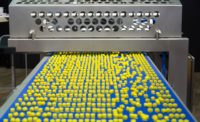Organizers for ProSweets Cologne, set for Jan. 30-Feb. 2, 2022, say the fair will focus on sustainable packaging for the sweets and snacks industries, including paper, recyclable mono films and related packaging processes.
Recycling-friendly design will become of key importance in advertising and communications once the EU's Green Deal takes effect, a trend that will be reflected at ProSweets Cologne. Furthermore, 44 percent of respondents to a March survey conducted by the German Packaging Institute (dvi) reported they believe that packaging had progressed considerably in terms of its environmental-friendliness.
"Packaging is becoming more sustainable, while at the same time fulfilling its purpose more efficiently,” said Kim Cheng, executive director of the German Packaging Institute. “It is hygienic, protects the goods from damage and perishing, makes them last longer, transportable and safe to use.”
In the meantime, paper and cardboard are being implemented instead of plastic where possible. Innovative paper solutions feature integrated hot-sealing possibilities and moisture barriers against steam. At the same time, they comprise up to 95 percent or more of renewable materials.
"What was still inconceivable for most suppliers a few years ago has developed much further in the meantime because more and more fiber-based packing alternatives with barrier functions are replacing plastics," said Peter Désilets, executive director of Pacoon GmbH.
As a partner of Koelnmesse, the Munich agency for packaging design and sustainability is presenting solutions for sweets and snacks in a special exhibition in Hall 10.1. With his reusable concept for crisps, Désilets and the Pacoon team want to open up the discussion and demonstrate at ProSweets Cologne that a "solution has to rethink more than just the packaging itself." The Sustainable Packing Institute (SPI) for the Life Science Industry of Albstadt-Sigmaringen University will also be part of the special packaging event at ProSweets Cologne. The SPI is focused on biogenic resources, functional materials, smart packaging, bio-economy and sustainability.
Meanwhile, packaging equipment manufacturers must unite technological and economical aspects while finding alternatives for plastic. Tailor-made modular systems, the consistent implementation of robotics, and flexible retrofitting that allows adaptations to new packaging materials are paving the way toward more sustainability. The machinability of the new packaging materials is critical for developers in order to avoid quality deviations, faulty packaging and product damages. All steps, from shaping to sealing, have to be synchronized in order to minimize the burden of the packaging material. Machines that enable a good sealing and foil run behavior or the exact processing of boxes are just as important as packaging machines that can quickly be changed over to new formats.
ProSweets Cologne’s exhibitors offer case packer and pick-and-place lines, as well as tubular bag machines. In many of the presented packaging lines, both plastic and carton packaging can be processed. For instance, Theegarten-Pactec will demonstrate how producers of bars can process their products in tubular bags made from paper-based packing materials. The equipment supplier has developed the modular machine in such a way that it can complete the job using either cold or hot sealing processes. A further innovation is suction sealing technology that wraps bars and filled chocolates in recyclable mono film in letter folding format with or without a banderole, allowing the same performance level and makes the use of composite materials superfluous.
However, paper-based alternatives for standup pouches and flat pouches, deep-drawn trays, shells and blisters are still in the early stages of development. For example, paper tolerates little tension during an automated packing process and can tear more easily. The use of plastic is still necessary when it comes to guaranteeing a long sell-by date. Mono films unite product protection with recyclability, because their single-origin material allows the plastic to be reused. Even small-sized and sensitive chocolate products, filled chocolates and pastries can be packed in thin polyethylene terephthalate (PET) or polypropylene film (PP) using material-saving methods. Furthermore, PP can be processed in such a way that the film is sealable.




